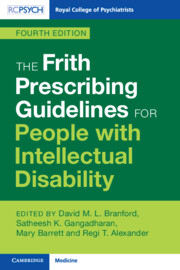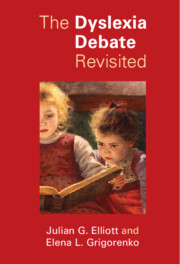Refine search
Actions for selected content:
42 results
The Mental Health Bill (2025) for England and Wales: professional and carer consensus statement summarising concerns and unintended consequences from proposed changes to autism and learning disability
-
- Journal:
- The British Journal of Psychiatry , FirstView
- Published online by Cambridge University Press:
- 01 July 2025, pp. 1-6
-
- Article
-
- You have access
- Open access
- HTML
- Export citation
Factors influencing physical healthcare quality for people with intellectual disabilities: psychiatry multidisciplinary team perspective
-
- Journal:
- BJPsych Open / Volume 11 / Issue 4 / July 2025
- Published online by Cambridge University Press:
- 30 June 2025, e137
-
- Article
-
- You have access
- Open access
- HTML
- Export citation
2 - When Does Hoarding Arise?
-
- Book:
- Everything You Need to Know About Hoarding
- Published online:
- 10 April 2025
- Print publication:
- 10 April 2025, pp 15-31
-
- Chapter
- Export citation
Chapter 1 - Intellectual Disability
-
-
- Book:
- The Frith Prescribing Guidelines for People with Intellectual Disability
- Published online:
- 07 November 2024
- Print publication:
- 21 November 2024, pp 1-12
-
- Chapter
-
- You have access
- HTML
- Export citation

The Frith Prescribing Guidelines for People with Intellectual Disability
-
- Published online:
- 07 November 2024
- Print publication:
- 21 November 2024

The Dyslexia Debate Revisited
-
- Published online:
- 30 March 2024
- Print publication:
- 18 April 2024
Chapter 24 - The Complex Needs Patient
-
-
- Book:
- Psychiatric Intensive Care
- Published online:
- 15 March 2024
- Print publication:
- 28 March 2024, pp 295-306
-
- Chapter
- Export citation
Couples with intellectual disability where one partner has dementia – a scoping review exploring relationships in the context of dementia and intellectual disability
-
- Journal:
- Ageing & Society / Volume 44 / Issue 11 / November 2024
- Published online by Cambridge University Press:
- 03 February 2023, pp. 2530-2569
- Print publication:
- November 2024
-
- Article
-
- You have access
- Open access
- HTML
- Export citation
Investigating the impact of volunteering with Melody Music Birmingham on the professional development and career pathways of Royal Birmingham Conservatoire students
-
- Journal:
- British Journal of Music Education / Volume 40 / Issue 2 / July 2023
- Published online by Cambridge University Press:
- 12 September 2022, pp. 220-233
- Print publication:
- July 2023
-
- Article
-
- You have access
- Open access
- HTML
- Export citation
Chapter 5 - Neurodevelopmental Disorders and Attendance at School
-
-
- Book:
- Mental Health and Attendance at School
- Published online:
- 24 March 2022
- Print publication:
- 31 March 2022, pp 78-105
-
- Chapter
- Export citation
Improving Access to Psychological Therapies (IAPT) services outcomes for people with learning disabilities: national data 2012–2013 to 2019–2020
-
- Journal:
- The Cognitive Behaviour Therapist / Volume 15 / 2022
- Published online by Cambridge University Press:
- 17 January 2022, e4
-
- Article
- Export citation
Sleep: the neglected life factor in adults with intellectual disabilities
-
- Journal:
- BJPsych Bulletin / Volume 47 / Issue 3 / June 2023
- Published online by Cambridge University Press:
- 23 December 2021, pp. 139-145
- Print publication:
- June 2023
-
- Article
-
- You have access
- Open access
- HTML
- Export citation
Autism spectrum disorder in older adults with intellectual disability: a scoping review
-
- Journal:
- Irish Journal of Psychological Medicine / Volume 39 / Issue 3 / September 2022
- Published online by Cambridge University Press:
- 06 October 2021, pp. 287-300
- Print publication:
- September 2022
-
- Article
- Export citation
Improving the way healthcare professionals deliver different news to families during pregnancy or at birth: a qualitative study
-
- Journal:
- Primary Health Care Research & Development / Volume 22 / 2021
- Published online by Cambridge University Press:
- 29 March 2021, e10
-
- Article
-
- You have access
- Open access
- HTML
- Export citation
Are we training psychiatrists to develop skills in intellectual disability psychiatry? Current European context and future directions
- Part of
-
- Journal:
- European Psychiatry / Volume 63 / Issue 1 / 2020
- Published online by Cambridge University Press:
- 13 November 2020, e99
-
- Article
-
- You have access
- Open access
- HTML
- Export citation
A lost decade? A renewed case for adult social care reform in England
-
- Journal:
- Journal of Social Policy / Volume 50 / Issue 2 / April 2021
- Published online by Cambridge University Press:
- 07 August 2020, pp. 406-437
- Print publication:
- April 2021
-
- Article
-
- You have access
- Open access
- HTML
- Export citation
The current state of training in psychiatry of intellectual disability: perspectives of trainees and trainers
-
- Journal:
- BJPsych Bulletin / Volume 45 / Issue 1 / February 2021
- Published online by Cambridge University Press:
- 07 July 2020, pp. 59-65
- Print publication:
- February 2021
-
- Article
-
- You have access
- Open access
- HTML
- Export citation
The relationship among children’s learning disabilities, working memory, and problem behaviours in a classroom setting: Three case studies
-
- Journal:
- The Educational and Developmental Psychologist / Volume 37 / Issue 1 / July 2020
- Published online by Cambridge University Press:
- 25 March 2020, pp. 4-10
- Print publication:
- July 2020
-
- Article
- Export citation
Exploring Participants’ Views on a Supported Work Internship Program for Autistic and Learning Disabled Young People
-
- Journal:
- International Journal of Disability Management / Volume 15 / 2020
- Published online by Cambridge University Press:
- 05 October 2020, e3
- Print publication:
- 2020
-
- Article
- Export citation
Long-stay patients with and without intellectual disability in forensic psychiatric settings: comparison of characteristics and needs
-
- Journal:
- BJPsych Open / Volume 4 / Issue 4 / July 2018
- Published online by Cambridge University Press:
- 28 June 2018, pp. 226-234
-
- Article
-
- You have access
- Open access
- HTML
- Export citation
